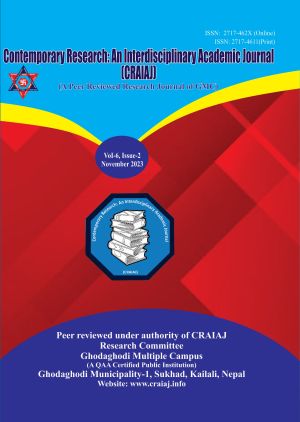Measuring the Relationship between Service Quality, Customer Satisfaction and Customer Loyalty in the Banking Sector of Nepal
DOI:
https://doi.org/10.3126/craiaj.v6i2.60248Keywords:
Customer loyalty, Customer satisfaction, Service quality, Structural equation modeling (SEM)Abstract
This study aims to examine the mediating effect of customer satisfaction in the relationship between service quality and customer loyalty in the banking sector of Nepal. Tangibility was taken as hard aspect and two dimensions; responsiveness and assurance were taken as soft aspects of service quality to measure customer satisfaction and loyalty. 384 customers of three commercial banks operating in Kailali district i.e. Rastriya Banijya Bank, Nabil Bank and Global IME bank were surveyed using structured five-point Likert scale questionnaire. Data was collected via online and field surveyusing convenience sampling method.The research hypotheses were tested using Structural equation modeling (SEM) with the help of AMOS-22 software. The findings of this study revealed that there is significant positive relationship between service quality, customer satisfaction and loyalty. It means higher the service quality helps to increase customer satisfaction and loyalty. Customer satisfaction has partial mediation effect in the relationship between service quality and customer loyalty. The results of this study will help bank mangers to focus on their customer’s satisfaction and loyalty in order to develop the strategy for competitive advantages. Future researchers can conduct their study on serial and parallel mediation effect of customer satisfaction in service quality and customer loyalty.
Downloads
Downloads
Published
How to Cite
Issue
Section
License
Copyright (c) 2023 Ghodaghodi Multiple Campus, CRAIAJ

This work is licensed under a Creative Commons Attribution-NonCommercial-NoDerivatives 4.0 International License.
© Ghodaghodi Multiple Campus, Research Committee, RMC

This work is licensed under a Creative Commons Attribution-NonCommercial-NoDerivatives 4.0 International License. This license enables reusers to copy and distribute the material in any medium or format in unadapted form only, for noncommercial purposes only, and only so long as attribution is given to the creator.




